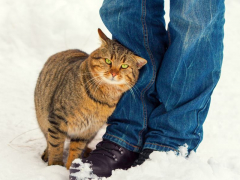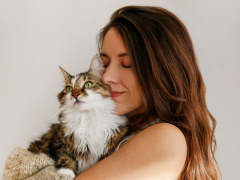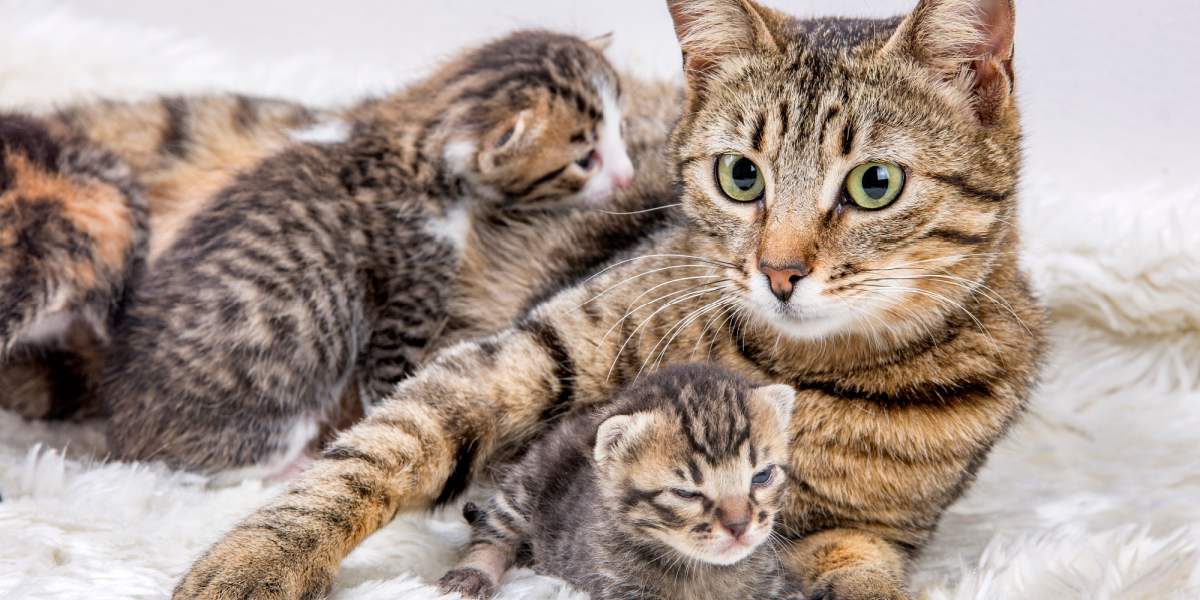
Disciplining kittens and correcting bad behavior is a completely normal part of feline behavior and an essential part of the kittens’ socialization. Kittens, just like human children, need to learn what behavior is appropriate and how to interact with one another.
Part of the job of the mother cat, known as the queen, is teaching her kittens right from wrong. Mother cats use a combination of physical and vocal corrections to discipline and guide the kittens. The vital learning period for kittens is within the first 2 to 7 weeks of life.Key Takeaways
It is the role of the mother cat, known as the queen, to teach them right from wrong. In the first 2 to 7 weeks of a kitten’s life, they learn how to read each other’s behavior and play nicely, as well as move from their mother’s milk to solid foods.
After that key socialization period, it becomes much harder to modify a cat’s behavior. So just how do mother cats do it? Let’s take a closer look!
Also Read: How To Have A Better Relationship With Your Cat
Discipline Versus Correction
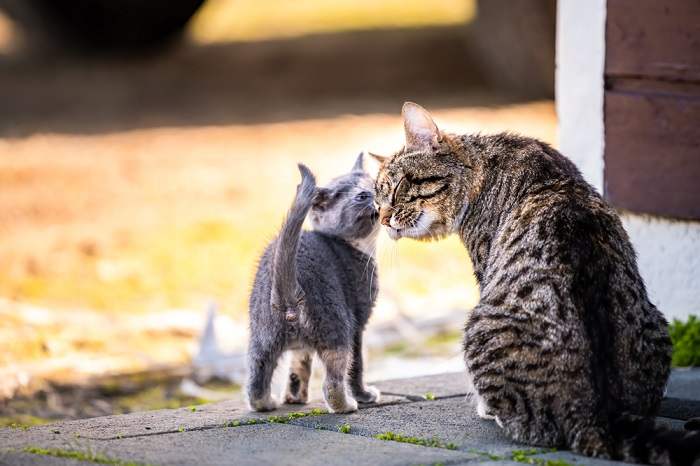
Discipline and correction are two different yet effective ways mother cats teach their kittens.
When it comes to discussing behavior and behavior modification in any species, not just cats, it’s important to differentiate between discipline and correction of inappropriate behaviors.
Discipline is usually associated with punishment or negative reinforcement so that the kitten associates that behavior or habit with negative consequences and therefore learns not to do it again. Correction is more about showing what is correct without the negative reinforcement, such as putting your cat straight in the litter box if they start to urinate on the floor rather than punishing them.
We cannot explain consequences to kittens like we can to humans, so for humans training feline family members, correction is usually better than discipline. However, you might see a mother cat discipline her young with a hiss or swat on the head.
Also Read: Can You Discipline A Cat?
Walking Away
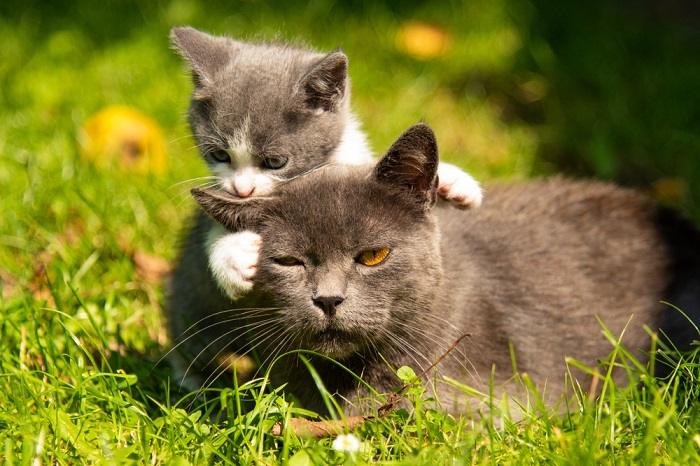
Disengaging or removing attention is an effective way mother cats correct their kittens.
A queen’s most valuable behavior-correcting tactic is the simple exercise of turning her back and walking away. This is because attention plays such an important role in training kittens to behave appropriately, whether that’s from their cat mom or their human family.
Kittens might play rough, or bite on each other’s tails as an act of attention seeking. Walking away sends a clear signal to the kittens that they aren’t going to get what they want.
This is how mother cats naturally wean their kittens. As the kittens go to suckle from the queen, she simply gets up and walks away—this tells the kittens that they can’t get their food from her anymore, and that the bowl of solid food is the source that they must use instead.
It might take a little while for the message to get through to the kittens and they will go back several times to suckle until they eventually realize that it’s not achieving anything and they can’t get what they want, and they will choose the bowl of cat food instead.
Also Read: The Complete Feeding Guide From Kittens To Seniors
Mother Cats Use a Combination of Physical and Vocal Corrections
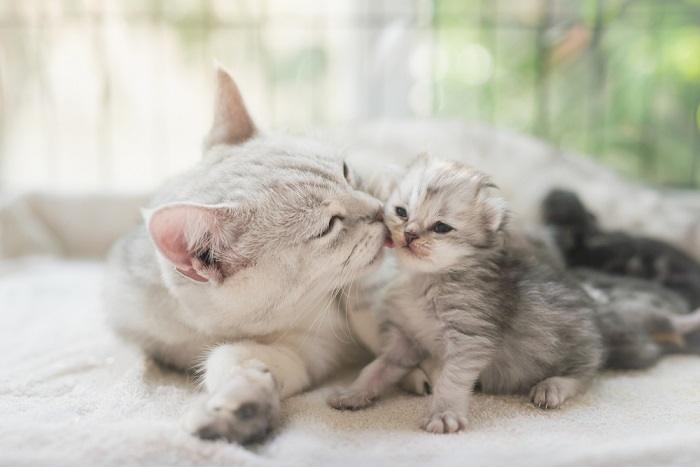
Growling or hissing can convey messages to the kittens that their behavior is not allowed.
If walking away does not work, a mother cat will move up to a vocal correction such as a hiss, assertive meow, or even a growl to correct her kittens’ bad behavior. These vocalizations are something that kittens instinctively understand from birth, so if they get a hiss from mom, they know it’s time to stop misbehaving!
A common example is when kittens chase and bite at each other’s tails in a playful way—they might get a gentle hiss from mom to tell them to cool off and play nicely.
Physical corrections might include a light bop or swat on the head, or even a gentle bite or nip. A mother cat knows just the right amount of pressure to get her point across and understood by her kittens without hurting them.
But this is not a method that humans should ever use to discipline kittens as they simply won’t interpret the message in the way that we hope.
Also Read: How Do You Train A Cat That Won’t Listen?
Do Kittens Learn From Their Littermates?
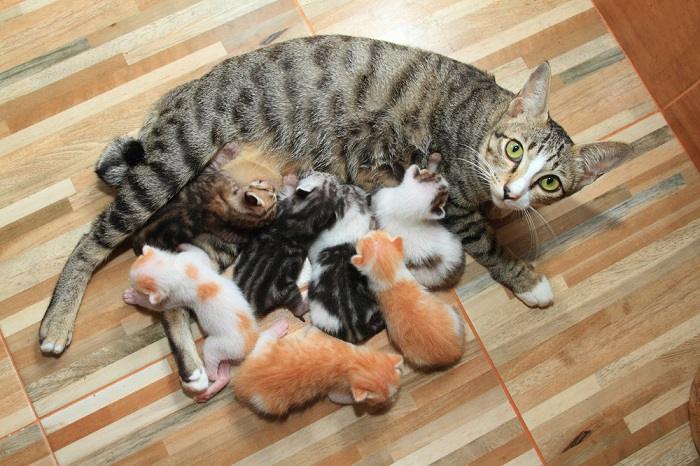
In addition to lessons from mom, kittens learn appropriate interactions from their littermates.
It’s not just their mom that kittens will listen to and learn from, they also pick up on behaviors and learn appropriate interactions from their littermates, and other adult cats they come into contact with. This is an essential part of early socialization and growing up.
We know that kittens love to play and that they often use their teeth to gently mouth. As youngsters they have to learn how much pressure they can use to bite without causing the receiver any pain or injury.
They learn this the hard way because if they bite their littermate too hard, the other kitten will cry and run away, and that’s the end of the game. That negative consequence teaches the kitten that they pushed their luck and to play more gently next time because aggression is not tolerated.
Also Read: Why Do Cats Groom Each Other? Reasons Why Cats Socially Groom
What Do Kittens Learn From Their Mother?
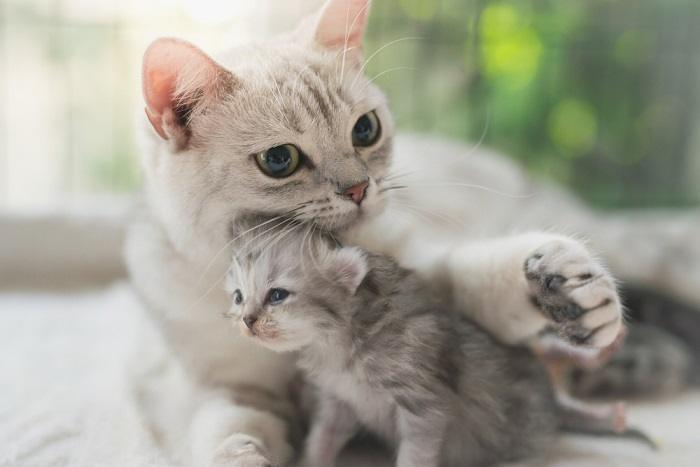
In the first 2 to 7 weeks of their lives, kittens go through the most important socialization and learning stage before they are separated from their mom and make their way to their new human families. A mother cat has a lot to teach her little ones in this time.
Kittens learn several key life skills from their mother:
- Safety and self-defense
- How to hunt prey
- Toileting
- What to eat
- How to interact with others
A mother cat will teach her kittens how to behave appropriately around each other, other animals, and humans. Kittens will learn how to play nicely, and not to cause any harm to one another by punishing them for playing too rough. They also learn how to hunt from their mothers—cats have a very natural instinct to hunt prey and it’s an important skill to develop.
Also Read: The 6 Best Automatic Self Cleaning Litter Boxes
How Should I Discipline My Kitten?
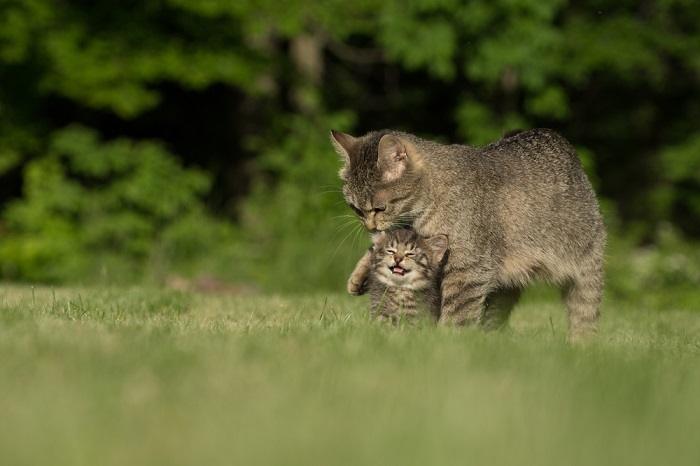
Humans must use different methods to discipline kittens than mother cats use.
When you bring home your new kitten and welcoming them into your family, your kitten should have learned most of what they need to know already from their mom. However, there are new things for pets to learn when they join our families.
So, should you discipline your kitten in the same way their cat mom does? Yes and no. You can use some of the same principles, however, your kitten won’t innately understand you in the same way their own species communicates. Regular handling of your kitten will ensure they get used to human contact and find comfort in interacting with you.
Walking away when your kitten behaves badly just like their mom does is often the best or the easiest way to let them know that they’ve been naughty. Your kitten replaces their desire for attention from their mom with a desire for attention from you, so if you don’t give it to them, they’ll quickly learn what’s right and wrong.
If playtime gets out of hand, and your kitten is nipping your hands or scratching, putting a stop to playtime will send them a message that they play nicely or not at all.
You can also use vocalizations, but be feline-friendly in your tone, so they understand. A firm “no” probably won’t cut it, but a hissing sound or a yelp will make sense to them; they associate this sound with the discipline their own mother gives them when they are very young.
Never use physical discipline to train your kitten, and never use any form of physical negative reinforcement. Always refrain from scruffing your cat, even though you might see a queen pick her small kittens up this way.
Things like urination or spraying around the house might seem frustrating, or when trying to steal food from your plate, but a redirection to the correct place to toilet and eat will be far more effective. It may take some repetition, as kittens don’t always learn the first time, but this is the kindest and most appropriate way to teach your kitten the best way to behave in your home.
Remember that rewards are also your friend—positive reinforcement of good behavior with praise and food is essential.
Also Read: The 7 Best Cat Treats For Kittens
Final Thoughts
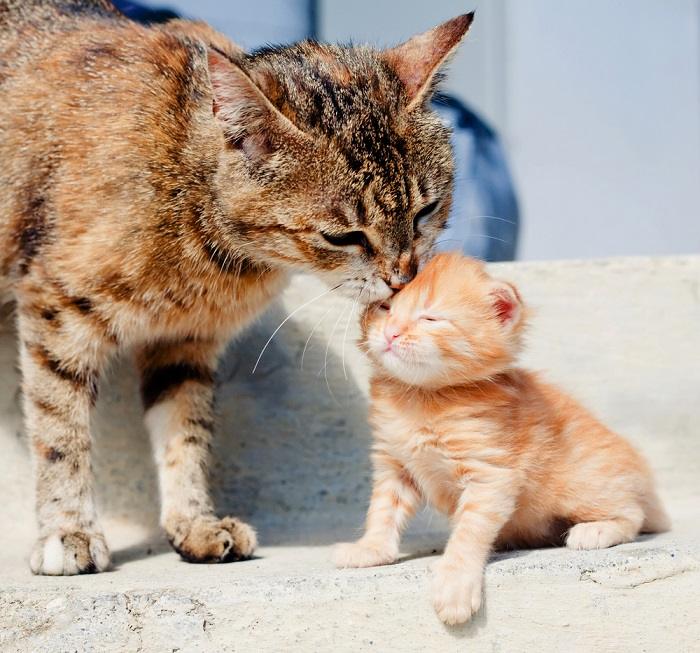
Mother cats have a big job of ensuring that their kittens have all the physical and social skills they need.
Mother cats use vocalizations and physical disciplines to correct their kitten’s behavior, as well as walking away from them so they don’t get attention when they play up. But they are not constantly reprimanding their kittens, and often use subtle ways of socializing their young.
All this needs to take place within the first 2 to 7 weeks to ensure they have the physical and social skills they need when they join their human family. We should only use corrections to modify our kitten’s behavior and should never try to mimic their mom’s discipline.
Also Read: How To Tell If A Cat Is Pregnant: Labor Signs, Behavior And Timeline
Frequently Asked Questions
How do mom cats teach kittens not to bite?
A mom cat will give her kittens a smack on the head or a hissing sound if they bite her or their siblings. This shows them that this isn’t a nice or appropriate behavior.
Why do mother cats get angry at kittens?
A mom cat might get angry at her kittens if they play too rough, behave inappropriately, eat something they shouldn’t, or disturb/annoy her.
Can kittens be disciplined?
Kittens can be disciplined both verbally or physically, but this should only be done by their cat mom, as they understand the language of their own species. As humans, we should only use correction to teach kittens appropriate behaviors.



